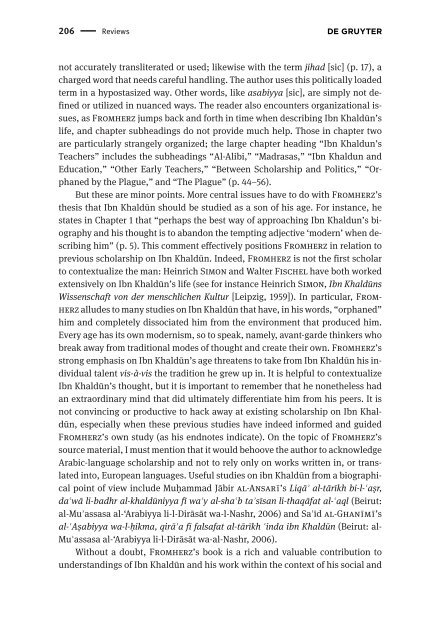0021-1818_islam_98-1-2-i-259
0021-1818_islam_98-1-2-i-259
0021-1818_islam_98-1-2-i-259
You also want an ePaper? Increase the reach of your titles
YUMPU automatically turns print PDFs into web optimized ePapers that Google loves.
206 Reviews<br />
not accurately transliterated or used; likewise with the term jihad [sic] (p. 17), a<br />
charged word that needs careful handling. The author uses this politically loaded<br />
term in a hypostasized way. Other words, like asabiyya [sic], are simply not defined<br />
or utilized in nuanced ways. The reader also encounters organizational issues,<br />
as Fromherz jumps back and forth in time when describing Ibn Khaldun’s<br />
life, and chapter subheadings do not provide much help. Those in chapter two<br />
are particularly strangely organized; the large chapter heading “Ibn Khaldun’s<br />
Teachers” includes the subheadings “Al-Alibi,” “Madrasas,” “Ibn Khaldun and<br />
Education,” “Other Early Teachers,” “Between Scholarship and Politics,” “Orphaned<br />
by the Plague,” and “The Plague” (p. 44–56).<br />
But these are minor points. More central issues have to do with Fromherz’s<br />
thesis that Ibn Khaldun should be studied as a son of his age. For instance, he<br />
states in Chapter 1 that “perhaps the best way of approaching Ibn Khaldun’s biography<br />
and his thought is to abandon the tempting adjective ‘modern’ when describing<br />
him” (p. 5). This comment effectively positions Fromherz in relation to<br />
previous scholarship on Ibn Khaldun. Indeed, Fromherz is not the first scholar<br />
to contextualize the man: Heinrich Simon and Walter Fischel have both worked<br />
extensively on Ibn Khaldun’s life (see for instance Heinrich Simon, Ibn Khalduns<br />
Wissenschaft von der menschlichen Kultur [Leipzig, 1959]). In particular, Fromherz<br />
alludes to many studies on Ibn Khaldun that have, in his words, “orphaned”<br />
him and completely dissociated him from the environment that produced him.<br />
Every age has its own modernism, so to speak, namely, avant-garde thinkers who<br />
break away from traditional modes of thought and create their own. Fromherz’s<br />
strong emphasis on Ibn Khaldun’s age threatens to take from Ibn Khaldun his individual<br />
talent vis-à-vis the tradition he grew up in. It is helpful to contextualize<br />
Ibn Khaldun’s thought, but it is important to remember that he nonetheless had<br />
an extraordinary mind that did ultimately differentiate him from his peers. It is<br />
not convincing or productive to hack away at existing scholarship on Ibn Khaldun,<br />
especially when these previous studies have indeed informed and guided<br />
Fromherz’s own study (as his endnotes indicate). On the topic of Fromherz’s<br />
source material, I must mention that it would behoove the author to acknowledge<br />
Arabic-language scholarship and not to rely only on works written in, or translated<br />
into, European languages. Useful studies on ibn Khaldun from a biographical<br />
point of view include Mu1ammad Jabir al-Ansarī’s Liqa# al-tarikh bi-l-^asr,<br />
da^wa li-badhr al-khalduniyya fi wa^y al-sha^b ta#sisan li-thaqafat al-^aql (Beirut:<br />
al-Mu#assasa al-‘Arabiyya li-l-Dirasat wa-l-Nashr, 2006) and Sa^\d al-Ghanīmī’s<br />
al-^Asabiyya wa-l-hikma, qira#a fi falsafat al-tarikh ^inda ibn Khaldun (Beirut: al-<br />
Mu#assasa al-‘Arabiyya li-l-Dirasat wa-al-Nashr, 2006).<br />
Without a doubt, Fromherz’s book is a rich and valuable contribution to<br />
understandings of Ibn Khaldun and his work within the context of his social and


